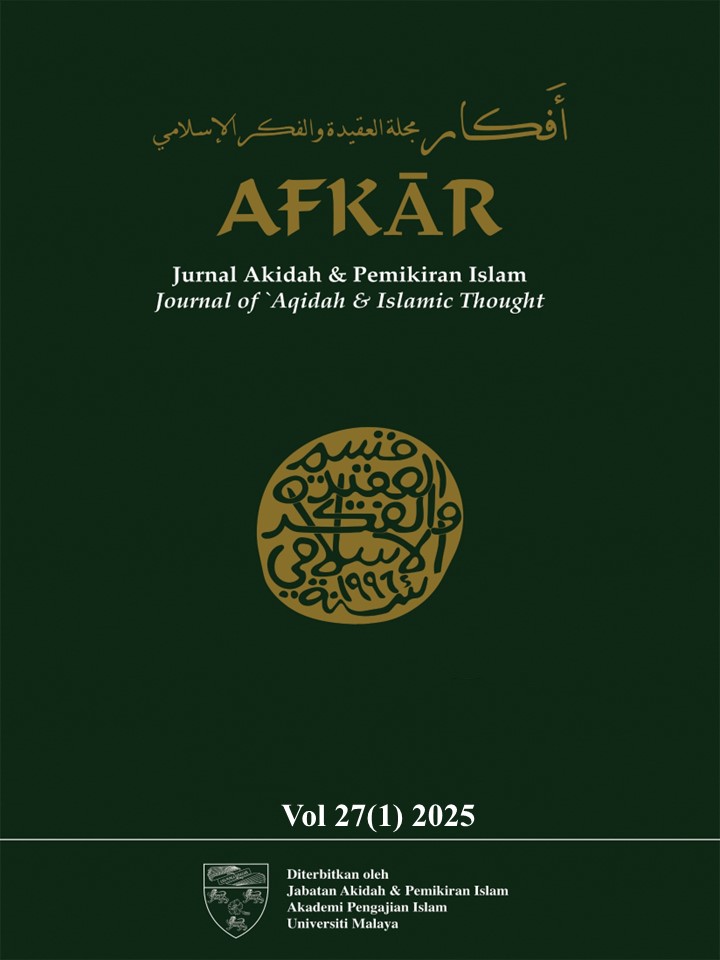The Question of Intelligence in the Philosophy of Artificial Intelligence
DOI:
https://doi.org/10.22452/afkar.%20vol27no1.11Keywords:
Intelligence, Artificial Intelligence, Artificial General Intelligence, intellect, Islamic intellectual tradition.Abstract
For more than seven decades, the question of whether it is possible to create intelligent machines has become the central debate in the philosophy of Artificial Intelligence. Many AI researchers, such as Simon and Newell (1958), McCarthy (1978), believe that it is possible to create thinking machines. This view apparently is the mainstream in today’s discourse of Artificial General Intelligence (AGI). This study extends the criticisms put forward by Dreyfus (1965), Searle (1980) and Chomsky (2012), who rejected the possibility of creating thinking and conscious machines. The main questions about the definition of intelligence and intellect are expounded especially from the perspective of Islamic tradition. The limitations of modern Western knowledge on the intellect and the reductionist tendency of Western scientists who limit the human mind to physical neurons have brought about confusion on the possibility of modern technology to create machines that are smarter than the smartest human being. To deliberate on this matter, the author refers to the works of scholars in the fields of philosophy and religion who have dealt with the question of human intelligence, culminating in an in-depth account by Muslim philosophers such as al-Ghazali (1058-1111) and al-Attas (born 1931) regarding the nature of human intellect and of knowledge.
Downloads
References
Al-Attas, Syed Muhammad Naquib. Islam and Secularism. Kuala Lumpur: ISTAC, 1993.
Al-Attas, Syed Muhammad Naquib. Islam the Covenants Fulfilled. Kuala Lumpur: Ta’dib International, 2023.
Al-Attas, Syed Muhammad Naquib. On Justice and the Nature of Man. Kuala Lumpur: IBFIM, 2015.
Al-Attas, Syed Muhammad Naquib. Prolegomena to the Metaphysics of Islam. Kuala Lumpur: ISTAC, 1998.
Al-Attas, Syed Muhammad Naquib. The Concept of Education in Islam. Kuala Lumpur: ISTAC, 1999.
Al-Ghazālī, Abū Ḥāmid. Iḥyā’ ‘Ulūm al-Dīn. Jeddah: Dar al-Minhaj, 2013.
Al-Jurjānī, ʿAlī ibn Muḥammad. Kitab al-Ta‘rifāt. Beirut: Dar al-Nafa’is, 2012.
Al-Rāzī, Fakhr al-Dīn. Mafātīḥ al-Ghayb. Beirut: Dar al-Kutub al-‘Ilmiyyah, 2009.
Al- Tahānawī, Muḥammad ibn ʿAlī. Kashshāf Istilaḥāt al-Funūn. Beirut: Dar al-Kutub al-‘Ilmiyyah, 1998.
Aristotle. Nicomachean Ethics, trans. J.E.C. Welldon. New York: Prometheos Books, 1987.
Bostrom, Nick. Superintelligence: Paths, Dangers, Strategies. Oxford: Oxford University Press, 2014.
Chomsky, Noam. “Noam Chomsky on Forgotten Methodologies in Artificial Intelligence.” Youtube Yarden Katz, Nov. 2 2012. https://www.youtube.com/watch?v=yyTx6a7VBjg&list=PL59ZZdDElkGerx3-zthr9fggzg0wtO_eQ.
Copeland, B.J. “Artificial Intelligence,” Encyclopedia Britannica, https://www.britannica.com/technology/artificial-intelligence.
Cravier, Daniel. AI: The Tumultuous History of the Search for Artificial Intelligence. New York: Basic Book, 1993.
Descartes, René. Discourse on Method, part V. Edinburgh: Sutherland and Knox, 1850.
Descartes, René. Treatise on Man, trans. Tim Newcomb. Cambridge, MA: Harvard Univ. Press, 1972.
Dreyfus, Hubert. Alchemy and Artificial Intelligence: Report for Rand Corporation. Santa Monica, CA: RAND Corporation. 1965.
Dreyfus, What Computers Still Can’t Do. Cambridge MA: MIT Press, 1992.
Frantz, Roger. “Herbert Simon: Artificial Intelligence as a Framework for Understanding Intuition.” Journal of Economic Psychology 24(2) (2003): 265-277.
Gobble, MaryAnne. “The Road to Artificial General Intelligence.” Research-Technology Management 62(3) (2019): 55-59.
Gouveia, Steven S. ed. The Age of Artificial Intelligence: An Exploration. Wilmington: Vernon Press, 2020.
Harari, Yuval Noah. “Human Dignity in the Age of AI.” Youtube Yuval Noah Harari, 9 May 2025. https://www.youtube.com/watch?app=desktop&v=2QXGDj9SAnI.
Harari, Yuval Noah. Nexus. New York: Random House, 2024.
Haris, Sam. Ted Talk, June 2016 https://www.ted.com/talks/sam_harris_can_we_build_ai_without_losing_control_over_it
Hobbes, Thomas. Leviathan. Oxford: Clarendon Press, 1909.
“Intelligence”. Oxford English Dictionary, accessed on 25th April 2025. https://www.oed.com/dictionary/intelligence_n?tab=meaning_and_use#214347
Juris Arrozy, Wendi Zarman. “Philosophical Underpinnings of Artificial Intelligence and the Concept of the Human Soul in Islam: Some Issues at the Interface.” TAFHIM: IKIM Journal of Islam and the Contemporary World 17(1) (2024): 23–55.
Kissinger, Henri A., Craig Mundie, Eric Schmidt. Genesis: Artificial Intelligence, Hope and the Human Spirit. New York: Little, Brown and Company, 2024.
Kissinger, Henry, Eric Schmidt, Daniel Huttenlocher, The Age of A.I. and Our Human Future. New York: Little, Brown and Company, 2021.
Kurzweil, Ray. “Are We Becoming an Endangered Species? Technology and Ethics in the Twenty First Century.” The Kurzweil Library, 20 November 2001. https://www.thekurzweillibrary.com/are-we-becoming-an-endangered-species-technology-and-ethics-in-the-twenty-first-century.
Kurzweil, Ray. The Age of Spiritual Machines. New York: Viking Press, 1999.
McCarthy, John. “Ascribing Mental Quality to Machine.” In Philosophical Perspectives in Artificial Intelligence, ed. Martin Ringle. Brighton: Harvester Press, 1979.
New Shorter Oxford English Dictionary, 6th ed. New York: Oxford University Press, 2007.
Pester, Patrick, “Top 10 Smartest Animal in the World,” BBC Science Focus, July 13th 2023. https://www.sciencefocus.com/nature/smartest-animals.
Plato, Republic, trans. Robin Waterfield. Oxford: Oxford Univ. Press, 1993.
Schmidt, Eric, “Dr. Eric Schmidt.” Youtube Special Competitive Studies Project, 11 April 2025. https://www.youtube.com/watch?v=L5jhEYofpaQ.
Searle, John. “Minds, Brains and Programs.”, The Behavioral and Brain Sciences 3(3) (1980): 417-424.
Simon and Newell. “Heuristic Problem Solving: The Next Advance in Operations Research.” Journal of the Operations Research Society of America 6(1) (1958): 1-10.
Simon, Herbert. “Models of Bounded Rationality.” In Economic Analysis and Public Policy. Cambridge, MA: MIT Press, 1982, vol. 1.
Suleiman, Mustafa. The Coming Wave: AI, Power and Our Future. London: Vintage, 2024.
Turing, Alan. “Computing Machinery and Intelligence.” Mind 49(236) (1950): 433-460.
UNESCO. Recommendation on the Ethics of Artificial Intelligence. New York: UNESCO 2021.
Wan Mohd Nor Wan Daud, Khalif Muammar A Harris. “Kerangka Komprehensif Pemikiran Melayu Abad ke-17 Masihi Berdasarkan Manuskrip Durr al-Fara’id Karangan Nuruddin al-Raniri.” SARI: International Journal of the Malay World and Civilisation 27(2) (2009): 119-146.
Downloads
Published
How to Cite
Issue
Section
License
Copyright (c) 2025 Afkar: Jurnal Akidah dan Pemikiran Islam

This work is licensed under a Creative Commons Attribution-NonCommercial 4.0 International License.









